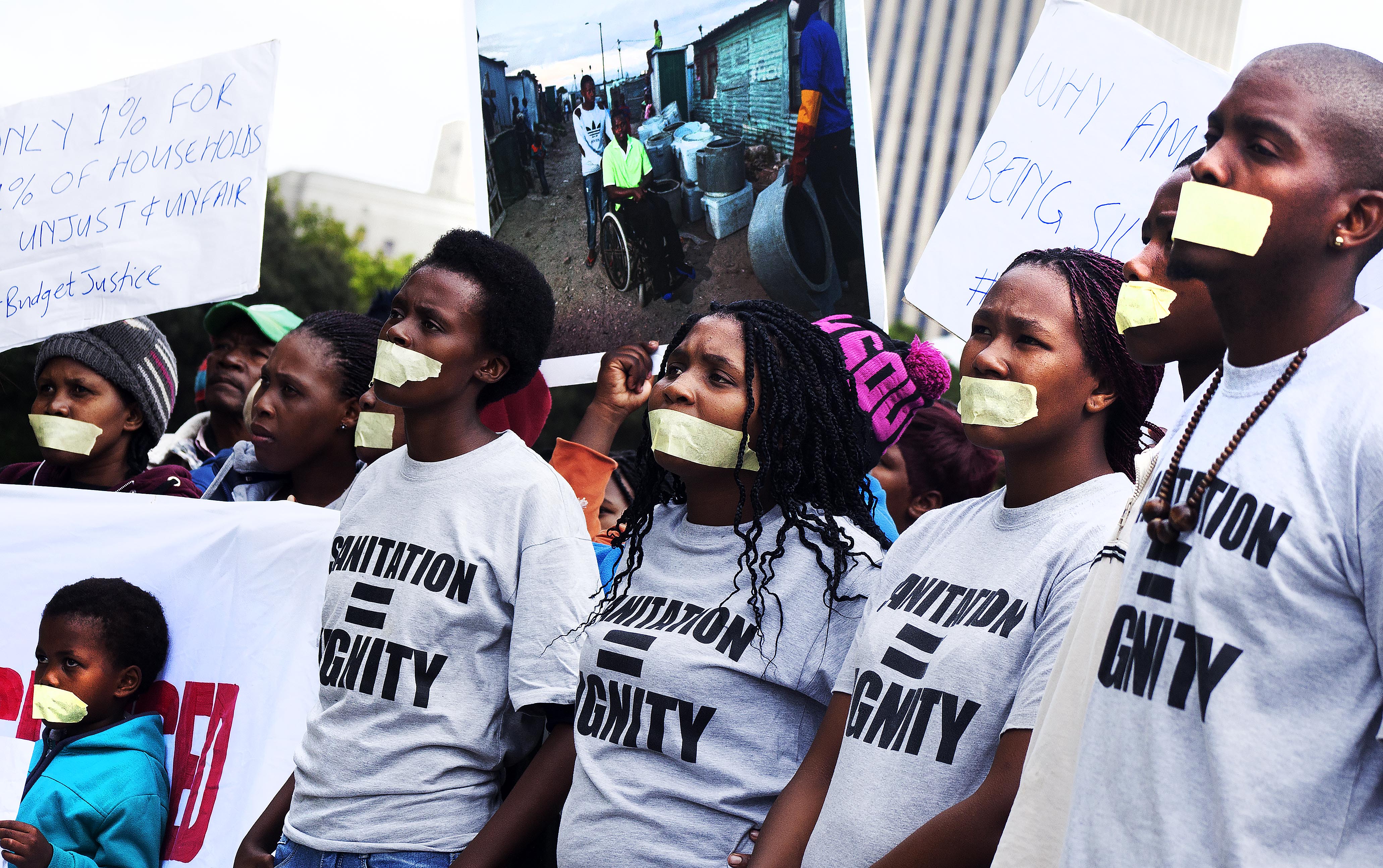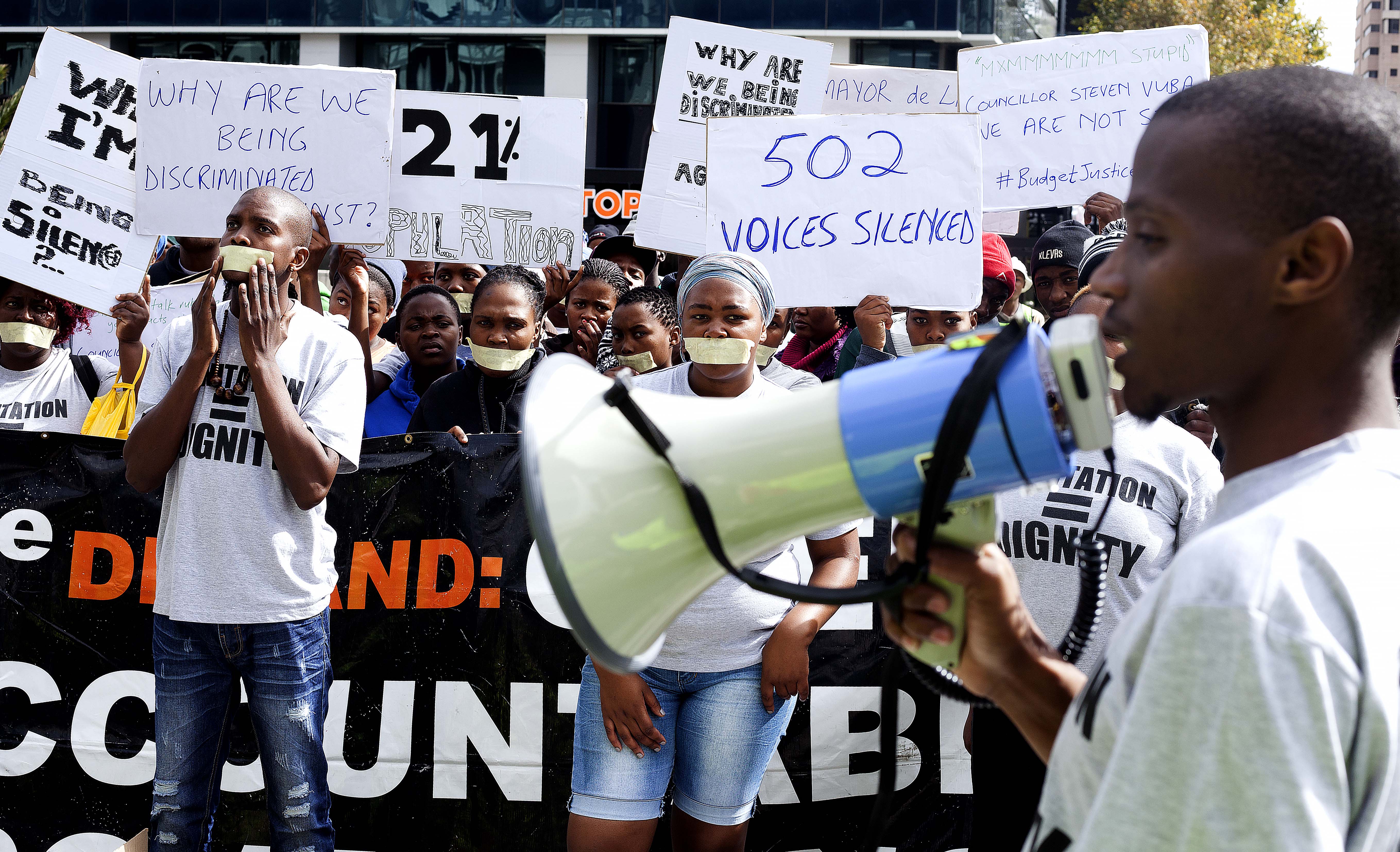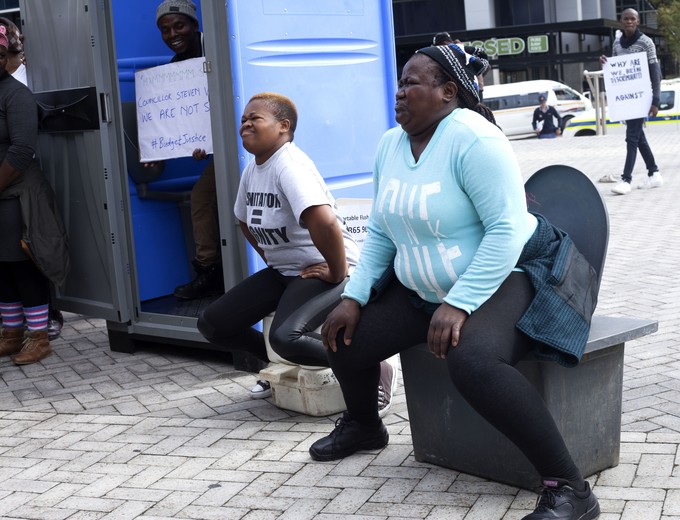Khayelitsha residents in stand-off with City
3,000 residents hand in submissions on budget
Khayelitsha residents were locked in a stand-off for several hours with city authorities today at the civic centre after a march to hand in 3,000 budget submissions.
The residents had marched to the civic centre to hand their submissions for the 2016-17 budget. The draft was tabled on 31 March.
The Social Justice Coalition (SJC), which was part of the march, also handed in its own submission, recommending among other things that Mayor Patricia de Lille allocate money in the budget for long- term sanitation infrastructure in CT section, Enkanini, TR section and RR section.
Residents waited in front of the civic centre waiting for city officials to accept their submissions. Some sat on symbolic toilets to highlight their daily difficulties with sanitation. One woman pretended to be using the toilet holding a door that couldn’t close properly.
Several boxes of neatly packed envelopes were handed to the Manager of the Mayoral Special Projects and Community Engagement for the office of the Mayor, Wilfred Solomons-Johannes, who accepted the submissions but refused to address the residents.
At the request of an SJC member he typed a letter acknowledging the submissions but suggesting they all came from the SJC. Residents insisted he change the letter to acknowledge that the submissions came from them, saying they would wait outside the civic centre until he did so. Later in the afternoon the residents left, saying they would write to the Mayor to ask for the letter to be rectified.
The SJC called on the City to publish a timeline for implementing sanitation in informal settlements and for upgrading of the settlements.
According to SJC, the City propose to spend only R15 million for 204 informal settlements in 2016, down from R20 million in 2014 and R18 million in 2015.
The SJC’s Axolile Notywala said last year residents had handed in 502 budget submissions but these had been ignored by the City.

“Our 502 submissions were ignored by the City of Cape Town while 124 submissions which came from other places in Cape town all received acknowledgement and received individual responses. We are asking the Mayor to listen to these residents and make sure that the unfair budget of the City of Cape Town is changed.”
Notywala said 21% of households in Cape Town received only 1% of the City’s water and sanitation budget.
“The budget is unfair and unjust,” he said.
He said chemical toilets were nine times as expensive as fully flush toilets, and the City was wasting money. The SJC had calculated that chemical toilets cost R237 254 to provide and portable toilets R65 964, while a fully flush toilet cost R27 746.
“They need to start treating informal settlements as permanent,” said Notywala.

Khayelitsha resident Nosakhele Mhlomi, who has lived in SST informal settlement for 23 years and who handed in a submission, says the City doesn’t care about residents’ living conditions.
Mhlomi looks after seven disabled children.
“We are given portable toilets and chemical toilets which are very difficult to use.
“There are many families using one toilet. They are dirty and small. We want fully flush toilets, enough for all the residents.”
Site C resident Nobathembu Seplani also handed in a submission.
“For how long must black poor people live like this? We are asking for proper toilets. These toilets smell and are not clean.
“I have had enough of using portable toilets. As an adult it is a disgrace to still use those,” said Seplani.
Support independent journalism
Donate using Payfast

Letters
Dear Editor
The City continues up to this day to proliferate the indignity of peripheral housing in bad locations which severely limits the ability to realize long term socio-economic integration for marginalized black and coloured households. Their model is still based on providing "the loo with a view" approach to limit the cost burden linked to building proper housing in well located areas to enhance mobility and access to proper locations with adequate infrastructure and socio-economic opportunities. The proliferation of such indignity is still perpetuated to this day without any comprehensive and meaningful development approach - the City can never be in a position to provide adequate housing in a situation that is not characterized by inclusion and a supportive environment for low income housing delivery based on different options.
© 2016 GroundUp. 
This article is licensed under a Creative Commons Attribution-NoDerivatives 4.0 International License.
You may republish this article, so long as you credit the authors and GroundUp, and do not change the text. Please include a link back to the original article.

